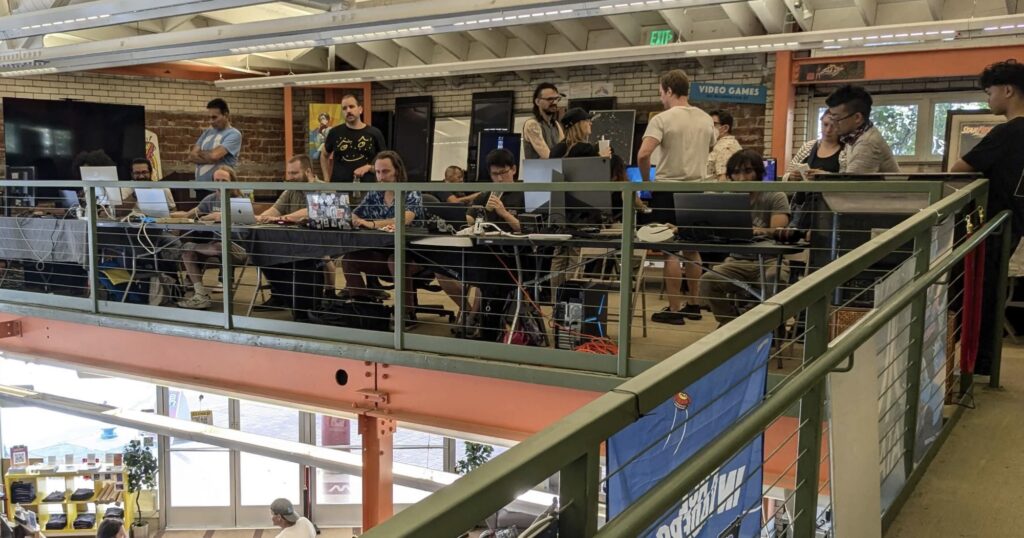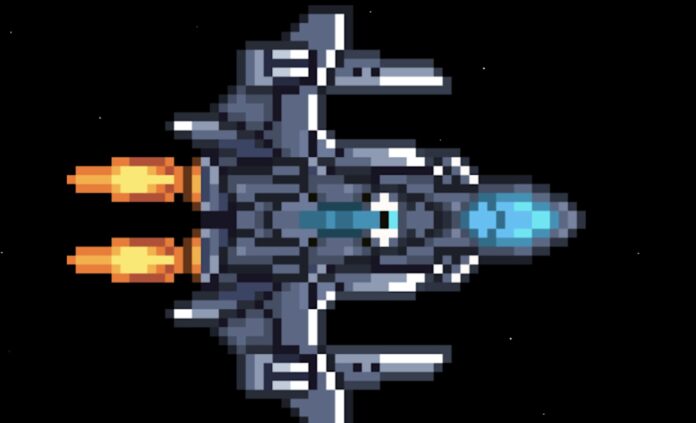“I think there’s a lot of AAA games that are hitting a breaking point, where they’re realizing you can’t just slap a bunch of mechanics together and call that a game.” It’s Friday, October 4th, and I’m speaking with Taylor Ritenour at the Museum of Art and Digital Entertertainment’s monthly indie developer showcase, each first Friday of the month, 5pm-9pm. He’s showing a top-down shooter tentatively titled GRAZE, inspired by the bullet-hell Touhou series and the speedrun-friendly setup of 2022’s Neon White. We’re talking about what it’s like to make indie games in the current landscape. He continues, “We’re in a period where it’s a lot more possible to become a game developer, and we’re at a higher level in our knowledge of how to make and design games.”
The breadth of the games at the showcase bears his analysis out. Over the course of two hours, I played a puzzle-platformer built around teleportation; a Vampire Survivors-style wave shooter; a meditation game in which I drift around and pollinate flowers; a side-scrolling platformer inspired by the story of Goldilocks and the three bears; and a mobile GPS game about fighting monsters via card battles. There were 2D games and 3D games, games that have been in development for years and games that have only been prototyped for weeks, games aiming to improve players’ emotional well-being and games seemingly designed from the ground up to be challenging and frustrating.
Mason Young, who serves as the MADE’s executive director, was showing two games—A.Gunna, the aforementioned wave shooter, and an addictive tile-clearing puzzler called Mind Match Plus. They told me that the showcase comes from a fusion of different groups and resources: “I want to make games, I want to be around games, I want to play games. Where’s a better place to do that than at the museum?… The East Bay Game Devs and Creatives [group] used to do a showcase of their own, and we’re actually fused with them now. We have this awesome venue, we have this awesome community, and now we all come together.”
This fusion of different priorities and levels of engagement meant that the featured developers were all at different stages of their careers and different experience levels; in this sense, the showcase felt pretty inspiring.
One of my favorite games of the night was called After Echo, made by the Oakland-based developer Jabari Alii. I played as a character with teleportation powers, able to set my position and return to it with a press of a button; I used this ability to warp through walls and across short levels to activate switches and moving platforms. The levels were tightly designed and pleasantly brain-scratching: difficult enough to make overcoming them feel good, easy enough to run through several in one sitting. Impressively, Alii told me that the game had only been in development for a couple of weeks.

As we spoke, he mentioned that he entered game design through music composition, saying, “At a certain point, a chain of opportunities happened and I started making music for games. And then it just kind of clicked and I was like, maybe I can make games too. I started studying design and coding and taught myself… It’s so amazing to create these worlds and experiences for everyone. [But it’s] nerve-wracking because, you know, the industry is tough.”
Alii’s words come on the heels of a strange and disorienting few years for video games. During the initial waves of the COVID pandemic, gaming exploded as people sought ways to socialize and relax without risking infection via in-person contact. A series of buzzy mergers and acquisitions followed, as huge companies consolidated into near-monopolies eager to control the expanding market. Sony purchased Halo and Destiny developers Bungie, Microsoft acquired Activision-Blizzard after a protracted legal battle, and the Swedish conglomerate Embracer Group snapped up seemingly every other studio in the industry.
Then, the bubble burst. Since 2023, the industry has been rocked by a series of layoffs, cancellations, and costly flops; last September, Sony shut down the servers for their multiplayer hero shooter Concord after only two weeks on the market and a reported $400 million sunk into its eight-year development cycle. In this rocky landscape, it’s difficult to find solid footing.
I spoke with Cameron Dodd, whose charming 2D platformer Three Bulky Bears started as a student project when he was studying at UC Santa Cruz, but has morphed into a larger undertaking since then. “We graduated, and we said, ‘We’re not going to get a job in the game industry right now anyway,’” he said, “So we might as well keep going with this and turn it into something real… It’s hard to get noticed, but I think that we’re doing OK.” The game is a sort of marker of his evolution as a developer: “I’ve always been interested in thinking about games and their design. But you can’t do anything with that unless you make it yourself. I like to create. It’s really nice, finally being experienced enough in enough things to actually make something.”
I heard variations of this theme from practically everyone I spoke with; all the developers were passionate about creating games, proud to show off what they’d made, and interested in learning from their peers. But this excitement comes with broader anxieties. “It’s rough out there right now, with the over-investment during COVID, and also because of AI,” Dodd says. “Companies are going, oh, we can replace half our staff with AI.”
Speaking of AI, the game that took up the largest amount of floor space was Cyber Impostor: AI Among Us. Unlike most of the games, this wasn’t a playable demo, but rather a sizzle reel displaying plastic-looking CGI characters against a cyberpunky backdrop. A flyer I received described the game as a test of critical thinking, in which players ask questions to an opposing team to deduce which team members are human and which are AI. When I asked Hengstar Gong, the lead developer on the game, what inspired its development, he replied, “We wanted to integrate the AI characters into our game to see how we can build the bonds between AI and humans, and prepare for the future of the AI world.”
While my conversation with Dodd touched on the larger fear and skepticism surrounding AI, Gong seemed like he was all-in on the technology, saying, “We’re not just making AI games, we’re making a gaming ecosystem… We’re [planning on] making a lot of different AI games in the future.” I mentioned that AI is a controversial technology; he agreed. But in an uncertain industry, he felt it was worth taking a chance on something new. “The industry right now, it’s too many games out there,” he said. “But our game is unique. You probably won’t have heard of this kind of game before… It’s kind of risky, but for us, I think there’s nothing to lose.”





